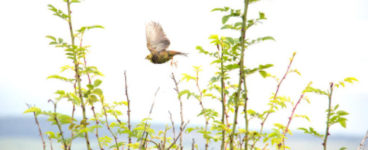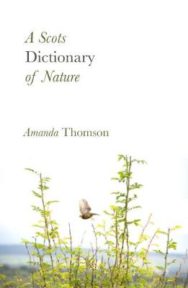‘There are so many words that are onomatopoeic – you can almost guess their meaning even if you don’t know the word: a glousterie day is filled with wind and rain, and gludder is the sound of a body falling into a mire.’
One of BooksfromScotland’s favourite releases last year was Amanda Thomson’s A Scots Dictionary of Nature. Here, she tells us more about her thoughts on the book and the Scots language.
A Scots Dictionary of Nature
by Amanda Thompson
Published by Saraband
Why are the words contained in the dictionary important?
The words help us to deepen our understanding of people and places, and they also pull us across time. They tap into the social history of Scotland – ways of living, being and interacting – but also reveal more personal connections, sometimes across different generations, so they allow us to remember in lots of different ways.
Why do you think these words, and the book as a whole, have so captured people’s imagination?
I think the book has captured people’s imagination in the same way that coming across the original 19th-century Jamieson’s A Dictionary of the Scots Language in a second-hand bookshop caught mine. Some words are really sharp and call it like it is – a fir gown for a coffin, for example. Many are poetic and hugely evocative, like huam – the moan of an owl on a warm summer’s day.
Other words we haven’t heard for a long time and perhaps remind us of childhood – I remember my papa calling sparrows speugs, and going for a dawner (walk) with my family every Sunday afternoon. So there are connections to people and places that resonate, and there’s also a poetry to a lot of the words and their definitions that captures the imagination.
What do these words say about Scotland’s people / culture / history?
They speak of a close relationship of people to place and landscape and to working the land – a lot of the words aren’t cosily nostalgic but point to the trials and tribulations of life. There’s something incredible about a harvest moon being called the break-back by harvest labourers because of the additional work the moon signified at that time of year. Or words relating to bonnage (bondage), or a word like herezeld, described in Jamieson’s dictionary as ‘the best beast on the land, given to the landlord on the death of the tenant’.
What is the future for the Scots language?
I’m not a linguist, so I can’t really say. Language is always evolving and it becomes what we need it to be. When I was doing background research for the book I came across 19th-century writers worried about the demise of the Scots language even then, and I think a part of Jamieson’s impetus behind the book was a fear of losing the language.
I’m more interested in how we can use certain words to see and understand the world before us – and in these Scots words there is an attention to the details of nature that I think is important to keep: in order to care about something you have to notice it, and these words aid that process, which is crucial as far as I’m concerned.
What are some of your favourite words in the dictionary?
My favourites change every time I look at the book. It depends, sometimes on where I am and what I am doing: whilst walking on a stormy day, I love the notion that trees flounce in the wind. And I love the specificity of some of the words or phrases – a calledin-o’-the-blade, for example, is a slight shower which cools and refreshes grass.
There are so many words that are onomatopoeic – you can almost guess their meaning even if you don’t know the word: a glousterie day is filled with wind and rain, and gludder is the sound of a body falling into a mire. To spoonge means to go about in a sneaky or suspicious way, so as to excite suspicion, as in “there he’s gauin spoongin’ about”.
We’re just past new year and I made sure to take the crap (crop) o’ the water – the first water taken from a well after midnight of December 31st, supposed to bring luck for the new year.
A Scots Dictionary of Nature by Amanda Thompson is published by Saraband, priced £12.99
ALSO IN THIS ISSUE

 A Scots Dictionary of Nature
A Scots Dictionary of Nature
‘There are so many words that are onomatopoeic – you can almost guess their meaning even if you don’ …














